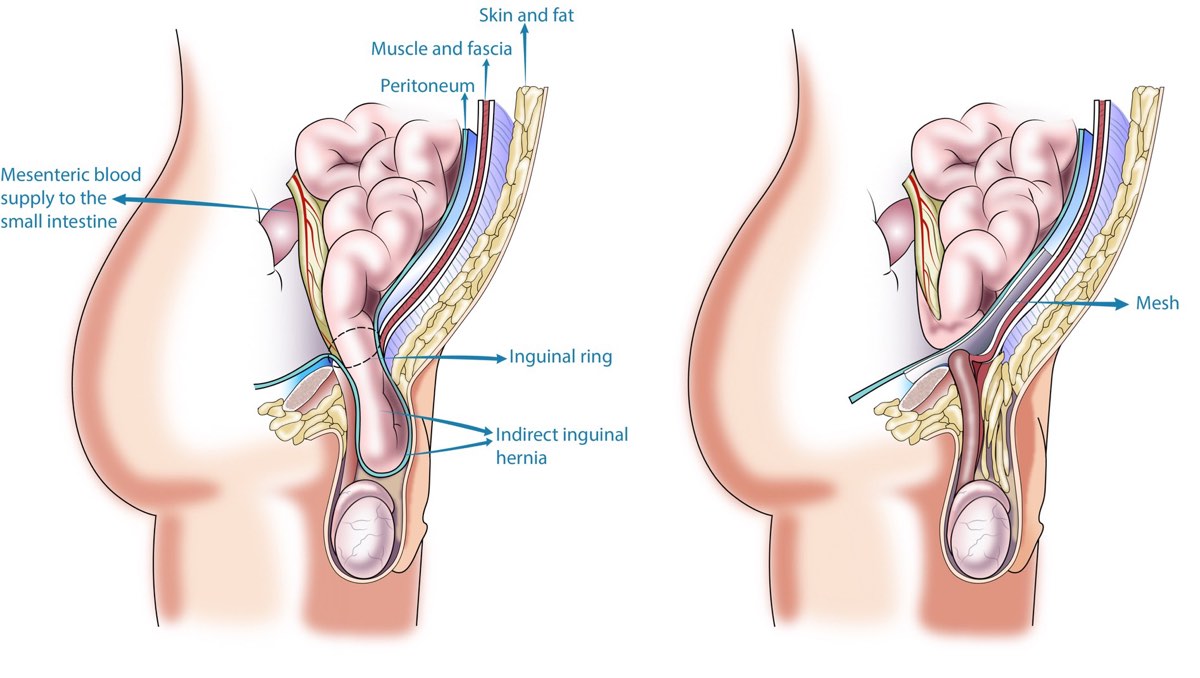Hernia Repair in Georgia
Search and Compare the Best Clinics and Doctors at the Lowest Prices for Hernia Repair in Georgia

Find the best clinics for Hernia Repair in Georgia
No clinics available
Mexico offers the best prices Worldwide
Price: $ 260

- Home
- Georgia
WHY US?
At Medijump, we're making medical easy. You can search, compare, discuss, and book your medical all in one place. We open the door to the best medical providers worldwide, saving you time and energy along the way, and it's all for FREE, no hidden fees, and no price markups guaranteed. So what are you waiting for?

Free

Best Price

Widest Selection

Risk-Free
What you need to know about Hernia Repair in Georgia

Hernia repair is a surgical procedure to correct a hernia – a condition when internal tissue or organ pushes through the muscle. It is typically performed when the hernia becomes strangulated, causes pain or discomfort, grows larger, or when the tissue becomes trapped in the abdominal wall.
What does a Hernia Repair Procedure Involve?
Hernia repair can be performed either with open surgery or laparoscopic surgery. Both are carried out under general anesthetic and involve returning the displaced organ or tissue to the body part that should contain it. Laparoscopic hernia repair surgery is preferred because it is minimally invasive and the recovery period is easier.
How Long Should I Stay in Georgia for a Hernia Repair Procedure?
You may need to stay in the hospital for one to three days, but you must not fly home right after you are discharged from the hospital. Plan to stay in the Georgia for around 7 to 14 days or until you get your surgeon's approval because traveling long-distance can lead to tearing of the sutures. You will attend a follow-up appointment during your stay to monitor your condition.
What's the Recovery Time for Hernia Repair Procedures in Georgia?
It may take around 3 to 6 weeks for a full recovery after open hernia surgery. Expect to take two weeks off work after the surgery. If you have laparoscopic surgery, you should be able to return to work and your normal routine within a week.
What sort of Aftercare is Required for Hernia Repair Procedures in Georgia?
Apply gentle pressure to your wound using your hand or a small pillow to make sneezing, coughing, and moving more comfortable. You can do some gentle exercises to help with the healing process, but avoid strenuous activities for around 4 to 6 weeks. Your surgeon will give you a set of instructions regarding your diet, caring for your wound, hygiene, and bathing. Make sure to follow all instructions.
What's the Success Rate of Hernia Repair Procedures in Georgia?
Hernia repair is proven to be effective and safe. Only around 11% of patients suffer from a recurrence following the surgery. Also, only 10 % to 12% of patients will experience chronic pain after surgery. Although the risks and side effects are rare, you still need to be aware of them. They typically include infection, blood clots, pain, and recurrence.
Are there Alternatives to Hernia Repair Procedures in Georgia?
If surgery is not an option for you, your alternative is to get non-surgical hernia treatments, such as wearing a corset, truss, or binder. They will keep the hernia in place and apply gentle pressure on it. Make sure to use them only under a doctor’s supervision.
What Should You Expect Before and After the Procedure
A hernia can be painful, uncomfortable, or even life-threatening. After a hernia repair, you no longer feel pain, discomfort, or any other symptoms. Your risk of becoming seriously ill has been reduced significantly.
Whilst the information presented here has been accurately sourced and verified by a medical professional for its accuracy, it is still advised to consult with your doctor before pursuing a medical treatment at one of the listed medical providers
No Time?
Tell us what you're looking for and we'll reachout to the top clinics all at once
Enquire Now

Popular Procedures in Georgia
Prices Start From $42

Prices Start From $4

Prices Start From $520

Prices Start From $520

Prices Start From $714

Recommended Medical Centers in Georgia for procedures similar to Hernia Repair

- Interpreter services
- Translation service
- Religious facilities
- Medical records transfer
- Medical travel insurance
- Health insurance coordination
- TV in the room
- Safe in the room
- Phone in the room
- Private rooms for patients available

- Interpreter services
- Translation service
- Religious facilities
- Medical records transfer
- Medical travel insurance
- Health insurance coordination
- TV in the room
- Safe in the room
- Phone in the room
- Private rooms for patients available

- Interpreter services
- Translation service
- Religious facilities
- Medical records transfer
- Medical travel insurance
- Health insurance coordination
- TV in the room
- Safe in the room
- Phone in the room
- Private rooms for patients available

- Interpreter services
- Translation service
- Religious facilities
- Medical records transfer
- Medical travel insurance
- Health insurance coordination
- TV in the room
- Safe in the room
- Phone in the room
- Private rooms for patients available
Hernia Repair in and around Georgia
Introduction
Georgia is located in the Caucasus region of Eurasia and it is the most visited country in South Caucasus. From its green valleys and vineyards to its old watchtowers and old churches, this country will never disappoint. Over the last 5 years, Georgia has been visited by an increasing number of medical tourists. These foreign patients, mostly come from Saudi Arabia, Kuwait, Iraq, and Russia, are attracted to Georgia’s high-quality and affordable medical care, as well as the medical center’s first-class services. Most of these patients come for dental treatments, cosmetic surgery, oncology, radiology, liver and kidney transplantation, bone marrow transplantation, orthopedics, infertility treatment, and bariatric surgery.
Popular Cities and Regions in Georgia
Georgia’s vibrant capital, Tbilisi, offers picturesque Old Town, outstanding architecture, dramatic valley setting, and terrific cuisine. Home to 30% of the country’s population, this city is lively and filled with hipster culture and techno scene. One of the most famous monuments in the city is Kartlis Deda, which is a 20-meter tall aluminum symbol of Tbilisi. Another popular city is Batumi, which is the country’s most charming seaside destination. Its synthesis of the mountain and the sea is truly unique and interesting. The most popular attractions in this city, besides its beach, are Batumi Boulevard, Batumi Botanical Garden, Medea Monument, Ortajame Mosque, and Batumi Archeological Museum.
Transport in Georgia
International tourists will arrive in Tbilisi International Airport. It serves flights to and from several cities in Europe, the Middle East, and Asia. There are numerous budget airlines that operate flights from this airport, including IndiGo, Ryanair, and AirAsia X. To travel around the country, domestic flights, buses, and trains are available. To get around major cities, several public transportation options are available. The most common way to get around is by local minibus and buses. Taxis are widely available, but make sure to agree on the fare before getting on.
Visas in Georgia
Georgia allows citizens of 98 countries, including all European Union countries, the US, Japan, and Australia, to stay for a year. Holders of passports issued by 66 countries, such as Bolivia and Egypt, are eligible to apply for e-Visa. The e-Visa is valid for 90 days per 180-day period and 30 days per 120-day period. Citizens of other countries, such as Sudan and Morocco, need to apply for a visa in advance.
Weather in Georgia
Winter in Georgia is usually very cold, with temperatures ranging from 2°C to 6°C, and sometimes dropping below 0°C at night. Summer, from June to August, is pleasantly warm with average temperatures of 20°C to 30°C. However, some coastal areas are humid during this season. Spring and Autumn are delightful as the weather is not too hot, nor too cold. Both of these seasons see frequent rainfalls.
Additional Info
- Local Currency: Lari (GEL) is the official currency of Georgia. 1 USD is equivalent to 2.7 GEL.
- Money & Payments: ATMs are easily available and credit cards are accepted in most restaurants, shops, and hotels. However, if you travel outside of Tbilisi, it’s best to bring plenty of cash. Tipping is expected.
- Local Language: Georgian is the official language. Russian is common, while English is becoming more widespread.
- Local Culture and Religion: The majority of Georgia’s population is Christian. Other religions, including Islam, Judaism, and Bahá'í Faith are present.
- Public holidays: Some of the most celebrated public holidays are New Year’s Day, Orthodox Christmas, Great Saturday, Day of Victory over Fascism, and Independence Day.
Popular Searches
- Plastic Surgery in Thailand
- Dental Implants in Thailand
- Hair Transplant in Thailand
- Breast Augmentation Thailand
- Gastric Sleeve in Thailand
- Gender Reassignment Surgery in Thailand
- Laser Hair Removal in Bangkok
- Botox in Bangkok
- Dermatology in Bangkok
- Breast Augmentation in Bangkok
- Coolsculpting in Bangkok
- Veneers in Turkey
- Hair Transplant in Turkey
- Rhinoplasty in Turkey
- Stem Cell Therapy in Mexico
- Rhinoplasty in Mexico
- Liposuction in Mexico
- Coolsculpting in Tijuana
- Rhinoplasty in Korea
- Scar Removal in Korea
- Gastric Sleeve in Turkey
- Bone Marrow Transplant in India
- Invisalign in Malaysia
- Plastic Surgery in the Dominican Republic
- Tummy Tuck in the Dominican Republic
- Plastic and Cosmetic Surgery in Poland
- Rhinoplasty in Poland
- Hair Implant in Poland
- Dental Implants in Poland
- IVF in Turkey